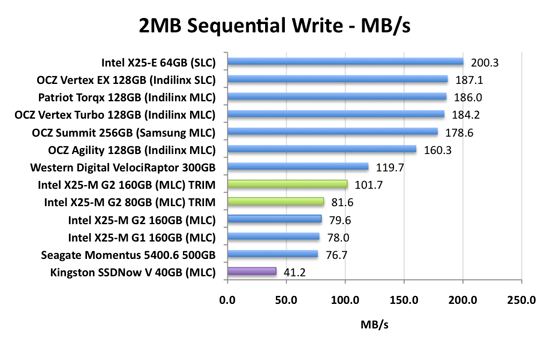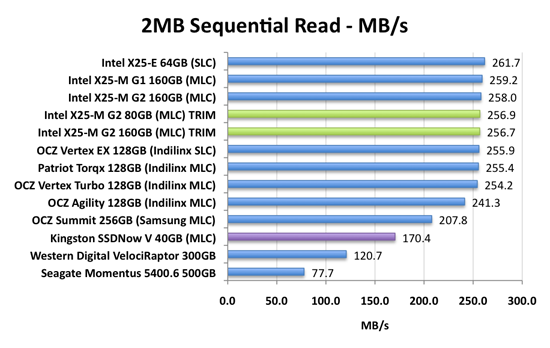The SSD Improv: Intel & Indilinx get TRIM, Kingston Brings Intel Down to $115
by Anand Lal Shimpi on November 17, 2009 7:00 PM EST- Posted in
- Storage
The Test
| CPU | Intel Core i7 965 running at 3.2GHz (Turbo & EIST Disabled) |
| Motherboard: | Intel DX58SO (Intel X58) |
| Chipset: | Intel X58 |
| Chipset Drivers: | Intel 9.1.1.1015 + Intel IMSM 8.9 |
| Memory: | Qimonda DDR3-1066 4 x 1GB (7-7-7-20) |
| Video Card: | eVGA GeForce GTX 285 |
| Video Drivers: | NVIDIA ForceWare 190.38 64-bit |
| Desktop Resolution: | 1920 x 1200 |
| OS: | Windows 7 x64 |
Sequential Read/Write Speed
Using the latest build of Iometer I ran a 3 minute long 2MB sequential write test over the entire span of the drive. The results reported are in average MB/s over the entire test length:

I ruined the surprise earlier, but the X25-M G2 160GB can now write at speeds of up to 100MB/s. The 80GB version doesn't get the benefit. The rest of the SSDs are approaching 2x that performance however. The poor Kingston drive is limited by its 5-channel implementation and barely manages more than 40MB/s. This will keep the Kingston SSDNow V series from cannibalizing X25-M sales, while at the same time offering a taste of what good SSDs have to offer at lower price points.

We're nearly tapped out on sequential read speed. The new TRIM firmware appears to drop performance a bit but not much. SATA 6Gbps will be necessary before we can see higher sequential read speeds from a single SSD.
True to Kingston's claims, the SSDNow V 40GB pulls around 170MB/s thanks to its narrower configuration. Not within arm's reach of the more expensive SSDs but still much faster than a mechanical drive.










162 Comments
View All Comments
The0ne - Monday, October 26, 2009 - link
No kidding. Early adopters really shouldn't complain, that's what you get for being the "elite." LMAO.As I've said before, just wait til early next to summer and the tech will be more mature. Yea, go ahead and make your argument that you can wait til next year but by then they'll be new products. That's cool...but I think ppl saying this have no clue about what's really happening around the technology.
Regardless, sounds nice to be saying it so woohooo be the first!
klil - Monday, October 26, 2009 - link
I dont think that you should lose the wiper and trim support for being an early adapter, it does not make senseThe only early adapter lesson i know of was that one from a intel processor that had a bug... pentiums from 1994: http://en.wikipedia.org/wiki/Pentium_FDIV_bug">http://en.wikipedia.org/wiki/Pentium_FDIV_bug
If they were not able to put it in due to hardware problems its one thing... but those drives cost 665 dollars in the beggining. I bet that if you had one you would not be happy :|
pcfxer - Tuesday, October 27, 2009 - link
ADOPTER, A-D-O-P-T-E-R.I can't even fathom how you could read what someone posts, "early adopter this....early adopter thaaat" and you go and type ADAPTER.
Adapter -> Adaptation between two or more objects.
Did you not have coffee yet man?
chizow - Monday, October 26, 2009 - link
Agreed, Intel will certainly meet more resistance in the future for their emergent technologies and undoubtedly lost the support of many of their most dedicated supporters with this decision.If there were some technical reason or incompatibility behind the lack of TRIM support on G1 that'd be one thing, but from what has been published by AT and others, its nothing more than indifference on Intel's part preventing support.
Blur - Tuesday, October 27, 2009 - link
Eloquently stated, i bought two of the G1 drives. I won't be suckered into supporting any of intels new tech early again and I'll be taking a much closer look at their competitors products when purchasing more established tech.Zingam - Monday, October 26, 2009 - link
Is there a change that a newer better technology will replace Flash so that we can finally have real SSDs at affordable prices?Zingam - Wednesday, October 28, 2009 - link
Sorry about the spelling/grammar errors above!therealnickdanger - Monday, October 26, 2009 - link
Intel was working on some sort of phase-change technology, not sure where it is now. Probably still too expensive for mainstream:http://www.dailytech.com/searchresults.aspx?keywor...">http://www.dailytech.com/searchresults.aspx?keywor...
MS - Monday, October 26, 2009 - link
Nanochip went belly-up and the IP was auctioned off. Ovonyx turned into Numonyx and PCM is still an emerging alternative to other technologies. The biggest issues relate to the limitatios in process technology, i.e, at about 20 nm geometry, the required write currents are expected to actually melt the metal interconnects. There are other technologies such as resistive memory as developed by 4-d-s and organic memories such as the ones from Zettacore that may become very attractive.Souka - Monday, October 26, 2009 - link
phase-change technology?Sounds like vapor-ware to me! :)